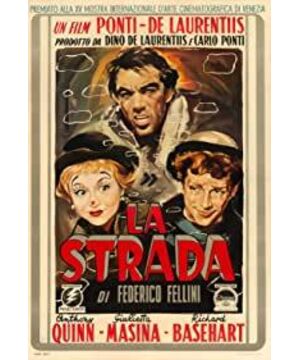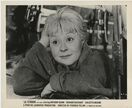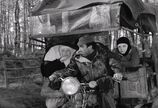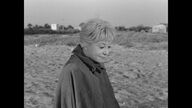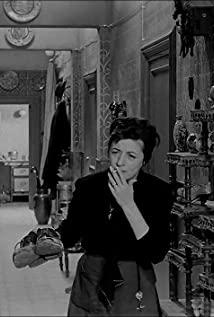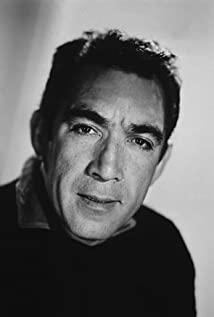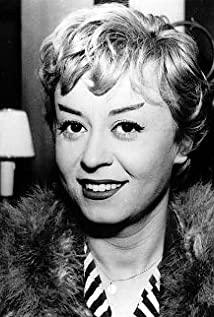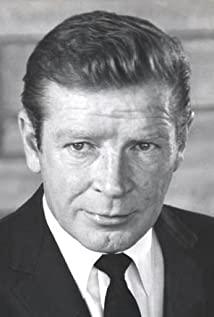Fellini's "The Road", completed in 1953, tells the story of a pair of wandering artists.
If such a story is given to Almodovar, it must be a colorful contrast and eye-catching plot narrative; if it is given to An Zhe, it must be an epic long mirror and eternal haze pursuit; if it is given to Bulle Song, it must be a calm fixed lens and thought-provoking social influence; if it is given to Quentin, it must be a frantic violent aesthetic feast. But the cross is due to Fellini, who combines Italian neo-realism with passion and romance. The story under his lens has no technical achievements worthy of attention-a large number of fixed lenses, a handful of panning, not to mention positioning photography, the content also looks like Chen Zhi's rotten valley, it is nothing more than a love story that cannot be sought. .
Many commentators are not optimistic about this, because "The Road" is neither as good as "Night of Kabylia" to reflect the current social situation at the time, nor is "Eight and a half" beautiful stream of consciousness, which is just a simple classical narrative. Simple film editing, random scene construction-but why should I waste my tongue here?
The story starts at the seaside, where there are sudden locomotives with silly girls, tossing and turning around and everywhere-this is somewhat similar to a road movie, but it is not the same. Finding and leaving are the eternal themes of road movies, but Zambano here walks a different path and lives a cyclical life. His opening statement is always the same: "This chain is 6 mm thick and is made of pig iron, which is more than steel. Hard, as long as I use my chest, I can break it into two pieces... Blood vessels may rupture and blood splashes. It is recommended that sensitive audiences turn their faces away, and they may bleed." Only vulgar brute force.
And Jesomina, the girl who doesn't look very bright, but is actually a little stupid, is even more pitiful. When she was ignorant, she was sold to the barbarians by her mother for 10,000 riel. She is different from other girls. She has big eyes and an onion head. She is really not smart. She regards the night with the savages as a ritual, and she is familiar with "If you are with me, don't say these silly things." She hopes to have a home, and hopes to plant tomato seeds wherever she passes. I don’t know "Why, do you still want to wait here until the tomatoes grow?" Later, afterwards, she couldn't. She felt that "The place where you are with you is my home."
A savage and a simple fool, such The combination has a definite ending from the beginning.
If it's a general director, that's fine, but here we are talking about "The Road", Fellini's "The Road". Since it is Fellini's love drama, it must be to earn enough tears and then put a flag in your heart. Since then, any kind of love movie can hardly be replaced.
Here, I want to start the interpretation of the film with the image of "dog". The director is too cunning, and every clue must be hidden deep. At the beginning of the film, the word "dog" was uttered by Zambano: "Don't worry, I can even teach a dog!" In the middle of the film, the little boy pointed to the other end of the fence and said to Jessomena: "A dog Die there..." At first I didn't understand the meaning of the sudden appearance of this seemingly unnecessary boy, until later, Jessomena died so lonely. The fool said to Jessomena: "He is like a dog. Have you ever seen a dog that wants to talk but barks loudly?" In short, this is the love story of two dogs. It's too straightforward to say it, but it is true. If a vulgar man meets a stupid silly girl, can the love produced in this way not be primitive and wild? The most profound words in the film are uttered through the mouth of a fool: "I have never been to school, but I have read some books. You may not believe it, but everything in the world is useful, even this stone... ...." This kind of "I am born with my talents must be useful" words are placed now, I am afraid that even junior high school students will not even look at them, but they are the most philosophical words Jesomina has heard, which convinced her. The meaning of my own existence is to be with that rough guy, because "If I'm not with him, who will be with him?"
No one knows the real name of the fool, Zambano doesn't know, we don't know, Jessoff Mina didn’t even know it. It seemed that his existence was to bring those words that anyone had value in. It seemed that he could only end in tragedy in the posture of cannon fodder armor-he seemed too smart, and ours "Big Road" only tells the love story of two "dogs".
Fellini’s symbolic system is more than just this one. I wonder if anyone has noticed from the beginning of the film to one-half of the time, but there must be children appearing where Jessomina passes, and adults always lose their innocence and innocence. Sending it to the child and calling it an "angel", this is even more vivid when a fool appears. He is like a light elf, stepping on a steel wire from the sky and appearing in front of her. The spotlight shines on him.
Then there is the use of sound. The first twenty minutes of the film is a black-and-white comedy, with funny soundtracks, funny girls, funny actions, funny hairstyles, and Zambano's funny performances... The director puts his romantic talents together. The comic is so obvious that I think it might end in this comic—and then it begins to change. The first thing that changes is the sound of the same period: the trumpet’s long and long mourning is reflected on Jesomina. In his eyes, it blows to the ears of the audience, through the entire film, and stays in Zambano's heart - so many years later, he drags his tired body and stubbornly shows the audience the "steel lungs". Hearing the melodious small tone still inevitably my eyes lit up and looking...Oh, how do you say that sentence? Words are still in my ears, and people are beyond the horizon.
Ordinary Chen Chen's movie language is like a thread connecting the pearls.
In a scene in the tavern, Zambano and Gesomina’s appearance was brought to the extreme by Fellini-the red-haired woman sat down next to Zambano, the three-person dialogue frame, the director specially avoided one person and one frame The technique of putting Jessomina out of Zambano's lens alone, as if blocked by something, her unconscious awkward smile looks out of tune with the red-haired woman Yun and Zambano, obviously she doesn’t understand anything. It's flirting.
Responding to the beginning of the story in the distance of the sea, the film finally ends in the sea. Zambano fell on the beach and wept bitterly. The camera slowly moved from the panoramic view to the panoramic view. The uncontrollable weeping sound was gradually buried by the sound of the waves. He was the only one left on the beach, and the only person willing to accompany him throughout his life had no idea where his soul would go.
I personally regard "Big Road" as my favorite Fellini's film. There is no one. If someone asks why, it is simple, and when it is simple to the extreme, it is interpreted to the extreme.
"If I die, will you cry?"
"Why, do you want to die? Go to bed!"
View more about La Strada reviews


